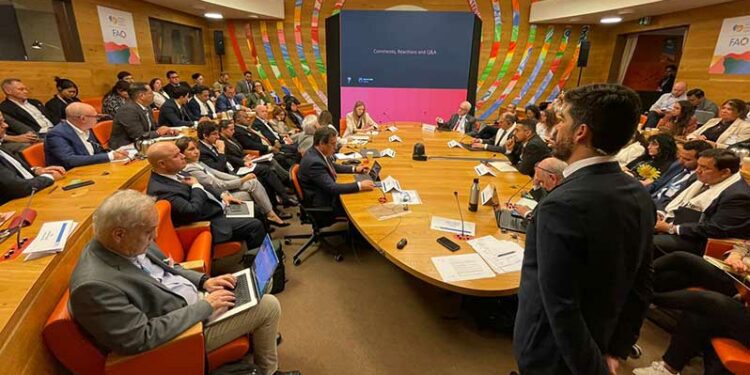–through investment programme presented by FAO, ACTO to promote inclusive rural transformation
AS part of the World Food Forum, the third edition of the Hand-in-Hand Investment Forum was held in Rome.
The event brought together delegations from governments, the private sector, civil society, and financial institutions from around the world.
In this context, the Food and Agriculture Organization of the United Nations (FAO) and the Amazon Cooperation Treaty Organization (ACTO) presented the Amazonian Bio-economy Investment Programme.
Participants in the session included Mario Lubetkin, FAO Deputy Director-General and Regional Representative; Máximo Torero, FAO Chief Economist; Vanessa Grazziotin, ACTO Executive Director; Esteban del Hierro, Deputy Minister of Productive and Agricultural Development of the Ministry of Agriculture and Livestock; Saulo Ceolin, General Coordinator for Food and Nutrition Security at Brazil’s Ministry of Foreign Affairs; and Pedro Martel, Head of the Environment, Rural Development, and Disaster Risk Management Division at the Inter-American Development Bank (IDB).
The programme aims to design and implement a public-private partnership based on catalytic investments in regional public goods and key value chains to achieve the transition towards an Amazonian bio-economy based on four key principles: reducing the high levels of food insecurity, poverty, and social and gender inequalities; respecting the rights, territories, traditional ways of life, and knowledge systems of indigenous peoples and other traditional communities; avoiding the Amazon rainforest’s point of no return; and ensuring sustainable agricultural practices.
The objective of this programme is to identify investment opportunities to consolidate a new bio-economy in the Amazon, based on three specific lines of investment: strengthening information management systems at both national and regional levels, linked to the Amazon Regional Observatory (ORA);
strengthening digital ecosystems in the Amazon to improve rural livelihoods and enhance traceability of selected bio-products; and improving fisheries management in the Amazon, based on existing data on the migratory catfish.
The Amazon Bio-economy Investment Programme of the Hand-in-Hand initiative covers a wide range of public goods, services, and value chains in eight countries of the region (Bolivia, Brazil, Colombia, Ecuador, Guyana, Peru, Suriname, and Venezuela).
It is based on four essential principles: reducing the high levels of food insecurity, poverty, and social and gender inequalities; respecting the rights, territories, traditional ways of life, and knowledge systems of indigenous peoples and other traditional communities; preventing the Amazon rainforest from reaching its point of no return; and ensuring the adoption of sustainable agricultural practices.
FAO Chief Economist, Máximo Torero, stated, “The areas we focus on are of high priority. It is a territorial approach that we follow in all Hand-in-Hand initiatives. Why are they of high priority? Because today, there is great poverty in those areas, but they are areas where forest activities could generate many benefits and lift people out of poverty sustainably.”
Vanessa Grazziotin, ACTO Executive Director, emphasised that “the Amazon region is very well-positioned to increase its relevance in the global bio-economymarket, especially if the right investments and short-term strategic actions are implemented.”
Mario Lubetkin, FAO Deputy Director-General and Regional Representative for Latin America and the Caribbean, highlighted, “FAO is implementing 125 projects in eight Amazonian countries. These projects represent an investment of $356 million, covering a wide range of issues and technical areas.”
CO-OPERATION TO BOOST THE AMAZON BIO-ECONOMY
As a result of bilateral meetings between FAO and ACTO with governments and the private sector, it was possible to identify more synergies and projects being developed in the Amazon.
For example, Nokia presented its innovative underwater connectivity infrastructure, which has already been implemented in 400 Amazonian communities, benefitting 500,000 users.
This technology, specifically designed for the rainforest, offers a safer, more reliable solution with reduced maintenance costs and ensures service continuity in remote regions.
During the meeting, the need to better understand connectivity demands from the perspective of different users, such as hospitals or small farmers, was highlighted.
Additionally, the relevance of the modularity and replicability of the proposed digital ecosystems was emphasised, and specific areas that should be prioritised in terms of connectivity were identified. The possibility of formalising a collaboration agreement among FAO, ACTO, and Nokia will be evaluated. (FAO)
Source link : http://www.bing.com/news/apiclick.aspx?ref=FexRss&aid=&tid=6718b326503c4a729fef63de0e18dab4&url=https%3A%2F%2Fguyanachronicle.com%2F2024%2F10%2F23%2Fguyana-to-benefit-from-amazonian-bio-economy-investment-strategies%2F&c=16593079729549166408&mkt=en-us
Author :
Publish date : 2024-10-22 21:03:00
Copyright for syndicated content belongs to the linked Source.




